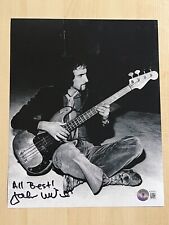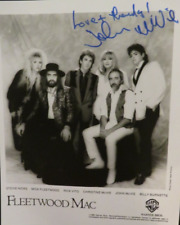|
| |
| |
|
|

|
HEADLINE: Still bucking the trend
BYLINE: Jim Farber
BODY:
Fleetwood Mac, minus Christine McVie, is bouncing back in the charts and on tour. Jim Farber reports from New York.
Twenty-eight years after Stevie Nicks and Lindsey Buckingham joined Fleetwood Mac, they still don't see eye to eye over the way the group should be.
The making of Say You Will, their first album of new material recorded with the band in 16 years, proves it.
"If I had my way, I would have started the album with the material most likely to offend as many people as possible," Buckingham says, with a giggle. "Stevie would bury all that stuff right at the end."
Continued Page 104
From Page 103
"I am not what you would call an envelope-pusher," Nicks says. "Lindsey is there to make sure our band isn't too safe. I'm there to make sure it isn't too nuts. It's all about balance between us."
The Fleetwood Mac pair concede they still find new ways to get on each other's nerves.
"We had a few bumps near the end of the project when Stevie came in off the road after her tour," Buckingham says.
"We had made quite a start on her stuff, and I think she was glad to have the collective arms around her because her tour was quite a burden on her. But, in some ways, she was looking at me (thinking), 'What's he going to do to my songs?"'
Nicks, a rock star in her own right, hadn't had to answer to her old boyfriend for some time.
"There was plenty of drama, things we had to hash out," Nicks says. "But that's what makes a great record. If everything went blissfully smooth it would be a blissfully boring record."
Say You Will represents the first time the songwriters have recorded a Fleetwood Mac album without the band's third writer and harmoniser, keyboard player Christine McVie (who joined the band in 1970, five years before Nicks and Buckingham).
The result changes the Fleetwood dynamic crucially. Lacking the light touch of McVie's sentimental pop songs, as well as her jaunty keyboard, Say You Will ends up a heavier, stranger and riskier work than Fleetwood Mac has made before.
It's as big a leap ahead as they made with 1979's Tusk, their eccentric and unlikely follow-up to one of the most popular albums of all time, 1977's Rumours, which sold in excess of 30 million copies worldwide.
The perception of Say You Will as a quirky work pleases Buckingham no end. He says he wishes the band had kept getting weirder after Tusk, instead of putting out such pop-oriented '80s albums as Mirage and Tango In The Night.
"The politics in the band at the time put the lid on that," the 55-year-old guitarist says.
One reason for the more adventurous approach on Say You Will has to do with its convoluted origins as a Buckingham solo project.
Back in the mid-'90s, Buckingham was making a solo album when he invited the band's old rhythm section -- drummer Mick Fleetwood and bassist John McVie -- to play along.
They all got on so well, it led to the 1997 album The Dance, which was the first full Mac reunion since 1987.
Halfway through the roadshow to support that album, however, Christine McVie told the other members she didn't want be in the band anymore.
According to Buckingham, the pianist had marriage problems, and longed to return to England, her homeland. She wound up divorcing and moving to the outskirts of London.
While Buckingham then wanted to complete the solo album he had started before the reunion, he says the band's record label, Warner Bros, had no interest in it. So, the material he had begun recording became the basis of Say You Will.
Nicks, who was committed to her own solo tour at the time, handed over 17 demos of her songs to the band to let them hammer them into shape.
Without McVie's piano playing, Buckingham says, "the remaining musicians had 33 1/3 per cent more room to manoeuvre. We were able to explore a more masculine sound. It's closer to what we're like live."
According to Buckingham, the absence of McVie's songs also allowed "Stevie and I to squarely face each other and create the kind of dynamic we had before we joined the band".
In the lyrics to the new album, the pair make eager use of their complicated personal history.
Several of Nicks' songs refer to her busted romance with Buckingham, more than 25 years ago.
The album closes with farewell numbers to each other. Nicks, 54, wrote hers in the '70s. Buckingham composed his around the time of The Dance.
Of course, the group has been airing its dirty laundry (with hugely profitable results) ever since the Rumours album, which chronicled two simultaneous break-ups within the band (the second being that of the McVies).
Buckingham marvels that "after all this time, Stevie and I still have something to give each other". (He has been married to Kristen Messner since 2000.)
Nicks, who remains unattached, says of her relationship with Buckingham: "We can never replace each other."
They say they understand each other far better now than they have in decades. But Nicks emphasises that they still argue every day. "That will never change. We are very different people. Stick us in a house together for a year and trauma will come out of that. But the result is, we don't make a blah record."
They also don't make a short one. Say You Will features 18 songs. As Nicks jokes, "You need two days to listen to it."
But it's time well spent. The set features some of the fastest and most intricate guitar work to date from Buckingham, and some of the most honest and longing lyrics from Nicks.
The group wants to bring as much of that excitement as possible to its forthcoming tour. The show will feature several old Christine McVie songs.
But the band faces a dilemma in capturing what Buckingham calls "the spirit of the band now".
"There are forces that would be happy just to present this as a nostalgia act," he says. "We want to walk a line -- to be fresh and dignified and yet not alienate too much of the audience."
Say You Will, released by Warner Music, is in stores now. A Fleetwood Mac Australian tour is in the offing later this year.
|
|
|
|
| |
|
|









